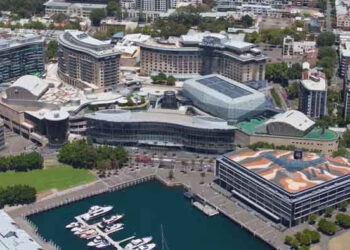Morgan Stanley analysts have returned from a recent trip to Japan decidedly less optimistic about the timing of the country’s nascent casino market and its revenue potential.
“We believe that consensus may be too bullish on the size of the market, the return profile for global gaming operators, and the speed of execution,” write Praveen Choudhary and Alex Poon in Hong Kong and Thomas Allen in New York.
The latest of the investment bank’s Asia Insights reports, “Japan—Tempered Enthusiasm,” a detailed 23-page analysis culled from recent meetings with policymakers, consultants and various stakeholders, covers the key areas that have excited so much interest worldwide among operators and the investment community: namely, when legalization will pass and regulations implemented, the possibility of at least one opening by 2019 or 2020, and the potential in terms of gaming revenue and return on investment. In each, they suggest a reality check is in order.
It is widely believed that the casino authorization bill introduced in the Diet in December will be debated in May and passed before the session ends on 22nd June, launching a process by which a follow-up bill addressing the thornier issues of regulation, taxation and licensing will be passed within a year. This view stems from Prime Minister Shinzo Abe’s popularity and his reputed support for legalization as a tool to boost foreign tourism in aid of the larger economy, which has been stagnant for decades. The initial bill was drafted by a coalition led by top lawmakers within Mr Abe’s Liberal Democratic Party, which together with its allies enjoys decisive majorities in the Diet and the upper House of Councillors. Tokyo’s selection last year to host the 2020 Summer Olympics has provided supporters with additional momentum and the timing of the market’s debut.
Choudhary, Poon and Allen rate the initial bill’s chances at better than 50%, but underscoring recent news reports of a possible delay, they caution that the back-room process of consensus-building that characterizes Japanese policy-making could take longer than presumed, especially given the social and political sensitivities. “If there is not enough time to debate, then the vote could be postponed to the fall or next year—and by then, the momentum could be lost,” they say.
The ensuing process of structuring the market will be even more complicated, with many moving parts to be aligned that must take into consideration the highly federalist nature of Japan’s prefecture system, the need to satisfy a plethora of national and local interests and a long history of social and political ambivalence regarding casinos. On these grounds, the consensus belief in a 12-month window for implementation “may be too optimistic,” they say.
“We see several steps to be taken, many new agencies to be created, and consensus to be built on the size of the tax, use of junkets, tax deductibility of incentives, number of casinos, locations, participation by local companies, and safeguards for the local people. We see no real pressure for casinos to be ready before the 2020 Olympics, as consensus has highlighted.”
As for recent gaming revenue forecasts of US$40 billion by 2025, they project a market that at best will achieve half that.
The bigger number is based on the belief that two mega-casinos in Tokyo and Osaka could generate $8 billion each and another 10 smaller regional casinos could generate $2.4 billion each. Choudhary, Poon and Allen have their doubts. They note that the country’s overall appeal as a tourist destination is relatively weak, as statistics show, particularly with regard to visitation from China. Its ability to attract Chinese high rollers, which they see as essential to fostering a Macau-like VIP market, they rate as questionable, especially if the regulatory line on junkets is drawn closer to Singapore’s than to Macau’s, which is likely. As for the prospects for substantial growth from an underserved domestic market they are less optimistic as well, based on the limited impact of Japanese players worldwide, declining trends in pachinko revenue, and their belief that converting pachinko players into slot machine players is in no ways a given.
Instead, they consider two factors—gross gaming revenue to nominal GDP and GGR to lottery turnover—in arriving at a market potential of $21 billion-$22 billion, and that’s a best-case scenario in their estimation.
1) GGR to nominal GDP: “The average is about 0.43% in Asia and US gaming markets,” they write. “If we apply this percentage to Japan’s 2013 nominal GDP of US$4.9 trillion, Japan’s GGR would be roughly US$21bn, only half of the market consensus of US$40bn. Even more importantly, this could be divided among 10-12 casinos across Japan and thus the Tokyo market’s GGR could be as low as US$5-6bn (though impressive in the context of Las Vegas/Singapore, which are US$6-7bn markets).”
2) GGR to lottery turnover: a “good indicator of how big the gambling business could be,” as they see it. “Singapore has the highest GGR to lottery turnover ratio among Asian gaming markets at 3.0. If we apply Singapore’s payout ratio to Japan’s drop of US$11bn, we come to Japan lottery revenue of US$7.26bn, implying casino GGR of US$21.8bn. Considering the lottery business is much closer to mass (but not VIP), a ratio of 1.6x would imply mass revenue of US$12bn. With a lower VIP revenue mix in Japan due to fewer Chinese players and potentially no junkets, overall GGR could be even lower than US$21.8bn.”
Bulls frequently point to the enormity of Japan’s pachinko market ($36 billion in 2012) as an indicator of revenue potential, but here, too, Praveen, Poon and Allen are contrarians. “It has been declining for the last several years,” they note, citing steadily falling handle dating back to 1996 and (since 2009) a decline in the average number of players per machine. In their view, both reflect declines they observe over the last several years in the earnings of Japan’s leisure sector overall and the spending power of Japanese consumers.
“Secondly, not all pachinko players will transplant to casinos when they open,” they contend. Assuming 20% do, they arrive at a Tokyo slot market based on $5 billion in current machine gaming revenue of $1.2 billion, which would be smaller than Macau’s ($1.78 billion in 2013).
Finally, factoring in the 20% direct tax on gaming revenue they project, which is not counting corporate tax and the additional taxes and fees at the local level that might also apply, and considering both the lofty entry price—operators are talking about investments of $5 billion-$10 billion—and the country’s relatively high construction and labor costs, they conclude that companies banking on 20% ROIC are likely to be disappointed.
“Returns of newer casinos have been falling mainly due to rising capex,” they write. “ROIC (EBITDA/invested capital) in the first year have been falling from as high as >100% (Sands Macao in 2004) to the recent 10-15% for Sands Cotai Central in Macau (10%) and Solaire in the Philippines (15%). With lower expected unit productivity in Japan, limited VIP/Chinese penetration and high capex, the casinos could generate lower returns.”






























